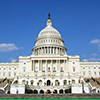President's Perspective – Hospital Leaders Gather in D.C. to Discuss Health Care Policies
 (Oct. 6, 2023) – This week, I had the opportunity to attend the American Hospital Association's National Regional Policy Board in Washington, D.C. Kansas is part of RPB 6 with Iowa, Missouri, Nebraska, South Dakota, North Dakota and Minnesota. While RPB 6 meetings are normally held in our Midwest region, every three years, AHA convenes hospital leaders from all nine RPB regions in Washington, DC to discuss and explore pertinent topics facing hospitals and health care systems across the country.
(Oct. 6, 2023) – This week, I had the opportunity to attend the American Hospital Association's National Regional Policy Board in Washington, D.C. Kansas is part of RPB 6 with Iowa, Missouri, Nebraska, South Dakota, North Dakota and Minnesota. While RPB 6 meetings are normally held in our Midwest region, every three years, AHA convenes hospital leaders from all nine RPB regions in Washington, DC to discuss and explore pertinent topics facing hospitals and health care systems across the country.
AHA kicked off the event with an advocacy update touching upon multiple legislative and regulatory issues. One policy initiative is Congress' consideration of site-neutral payment policies. In the U.S. House of Representatives, three congressional committees have deliberated on the topic this year, and both the Energy and Commerce and Ways and Means Committees have advanced site-neutral payment proposals as part of larger bills. These bills have been packaged for consideration on the floor of the House as H.R. 3561, the PATIENT Act of 2023. While this bill contains many good provisions, such as a permanent fix for the Affordable Care Act's disproportionate share hospital payment cuts and an expansion of graduate medical education slots, KHA opposes the inclusion of site-neutral payment language. Congress has responded to our concerns by slowing down consideration of H.R. 3561 and including other important health care provisions in the recently passed short-term budget bill.
Thus far, the U.S. Senate has shown far less interest in site-neutral Medicare payments for hospital outpatient departments. However, a bill introduced by Health, Education, Labor and Pensions Committee Chairman Bernie Sanders (I-VT) in July had a provision that would have limited HOPDs from billing insurance plans for certain procedures beyond the median in-market rate charged by non-hospital providers. A second draft of this bill, introduced in September and cosponsored by Senator Marshall, contained no such provision, but this version, which passed the committee on a 14-7 vote, would prohibit hospitals from charging facilities fees for telehealth visits. No floor action on this bill is expected any time soon.
There are several arguments against site-neutral payments, including the perspective that site-neutral payments are, in reality, Medicare cuts that will not only harm hospitals but also the patients they serve. Additional advocacy topics highlighted included safeguarding the 340B Drug Discount Program, protecting the health care workforce against violent acts, exposing the disadvantages with the Medicare Advantage program and pushing back on the Centers for Medicare & Medicaid Services' proposed rule on nursing home staffing ratios.
As part of the National RPB, we also had the opportunity to delve deeper into a few focused areas. The small group breakout sessions touched upon creating innovative and creative financial pathways for hospitals; exploring patient safety initiatives; and placing the responsibility with collecting patient cost-sharing responsibilities on health insurers. There were many imaginative ideas and suggestions offered by attendees. During the session on financial pathways, attendees considered attribution models (hospital services or insurance-based), as well as dedicated payment streams for essential services that are often unreimbursed or under-reimbursed (behavioral health and population health). While several questions remain regarding the details of any new payment model, the discussion afforded attendees the opportunity to understand the impact on patients, hospitals and the health care system.
While at the AHA National RPB, we also took advantage of meeting with the Kansas Congressional Delegation to emphasize several of the KHA advocacy priorities. Top among them included the protection of the 340B Drug Discount Program; rejecting site-neutral payment policies; and supporting flexibilities to support the health care workforce. Another topic discussed revolved around CMS' proposed nursing home staffing ratios. The draft policy will likely have a detrimental impact on the Kansas health care system. At present, many Kansas hospitals are already challenged to transfer patients to post-acute care settings. Requiring a minimum staffing ratio for nursing homes will inevitably exacerbate this issue, including diluting the availability of beds in nursing homes.
Kansas hospitals were well represented at the AHA National RPB. I would like to thank the Kansas delegates who participated in the meeting, including Sherri Vaughn, MD, The University of Kansas Health System, Kansas City; Melissa Atkins, Graham County Hospital, Hill City; Alan Verrill, MD, AdventHealth South Overland Park, Overland Park; and Larry Van Der Wege, Lindsborg Community Hospital, Lindsborg. Thank you for your leadership and representation of Kansas hospitals.
--Chad Austin